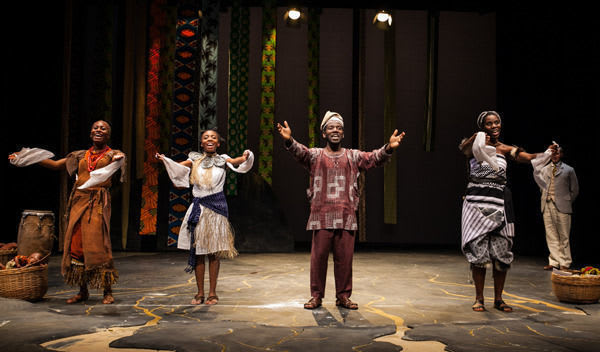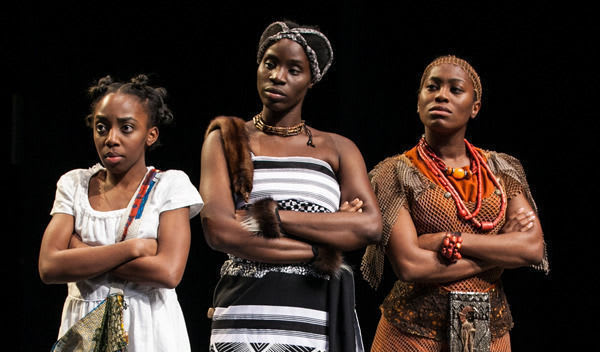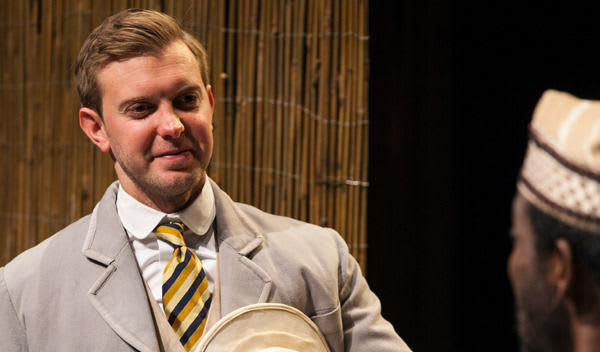It is a century since the modern state of Nigeria was formed by the British colonial administration from the territories of what had been individual tribal kingdoms; indeed the name Nigeria was not invented (by a journalist on The Times) until 1887.
At a time when ethnic and cultural groups in many parts of the world are seeking independent nationhood, this is a play that shows them being brought together, however arbitrarily. This is not a documentary but an imaginative analogy done with great élan but at times made incomprehensible by its no doubt authentic West African accents.
It is beautifully mounted. Designer Rajha Shakiry presents a bird’s-eye view of the Niger delta (itself an area of great conflict) laced with waterways which glow under UV lighting and backed by the bulk of a shadowy mountain and a star-studded sky. Traditional costumes and hanging streamers in African fabrics add a riot of colour under Azusa Ono’s lighting. There is also some very lively dancing to pulsing African rhythms—and a chicken.
It opens with the deep roar of thunder and the descent from the skies of Rita Balogun’s Oduduwa re-enacting a Yoruba creation myth. Oduduwa (who was to become the ancestral founder of the Yoruba royal house) has been sent by the sky god to create land and start life.
Down from heaven too comes a chicken in a basket (no! a live one in a pet carrier). Oduduwa brings soil to turn the marshy earth into dry land and scatters birdseed to bring the chicken out, so introducing animals. At least, I think that is what was happening, picked up from the visuals more than the narration which, though engagingly delivered, I could only half follow.
Some of the story is told through Benjamin Walden’s attractive video animation but that adds more complicated layers rather than making things clearer.
Next we meet Tunji Falana’s Herbert Ogunde. He’s introducing a new wife to his first one (Stephanie Levi-John and Rebecca Omogbehin) and later there will be a third joining them (Balogun).
It turns out that Henry is a 1914 show impresario—the wives are his actresses; marrying them makes them respectable (just as 18th-century English actresses called themselves Mrs to deflect accusations of immorality). Henry has been commissioned by colonial official Charles (Christian Roe) to create an entertainment to be performed to celebrate the creation of the new united country.
The squabbling actress wives represent the different tribal peoples of Nigeria and they chose to present a traditional story of a young woman and a spear that all the tribes wanted because it brought good harvests and prosperity. I think she finds, breaks and buries it so that people won’t fight over possessing it.
Charles watches rehearsals and isn’t very happy for this doesn’t give the positive message about unification he is wanting.
The history of Nigeria is not a happy one. From the Biafran War to contemporary conflict it has not been peaceful. There have been clashes between International conglomerates and local interests, economic exploitation and ecological stability but this comes over as a happy show rather than a gloomy one.
Its performers clearly have talent but I do wish I could have understood more. Writer / director Gbolahan Obisesan knows how to put a show together and make it engaging but he forgets that his audience’s ears won’t be as tuned to West African voices as his are. A slower delivery might help but risks making the show less lively.
For a wider British audience, the accents really do need to be less heavy, though the performance did seem to hold the young audience with whom I saw it. Perhaps young Londoners ears are more exposed to West African voices than I am, or maybe school preparation before the show made it easier for them to keep up with it.


